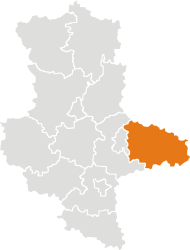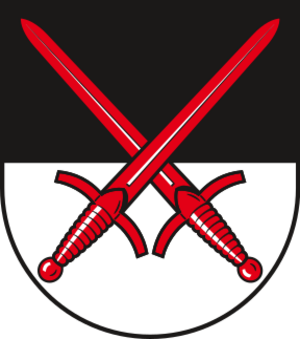Wittenberg Rural District facts for kids
Quick facts for kids
Wittenberg
|
|
|---|---|
 |
|
| Country | |
| State | Saxony-Anhalt |
| Capital | Wittenberg |
| Area | |
| • Total | 1,929.89 km2 (745.13 sq mi) |
| Population
(2006)
|
|
| • Total | 144.972 |
| • Density | 0.0751193/km2 (0.1945581/sq mi) |
| Time zone | UTC+1 (CET) |
| • Summer (DST) | UTC+2 (CEST) |
| Vehicle registration | WB |
| Website | landkreis-wittenberg.de |
Wittenberg is a district, which is like a region or area, located in the eastern part of Saxony-Anhalt, a state in Germany. Its capital city is also called Wittenberg, which is famous for its history.
Contents
Discovering Wittenberg's Past
The Wittenberg district has changed its size a few times over the years. In 1994, it joined together with the Jessen district and a small part of the Gräfenhainichen district. Later, in 2007, 27 towns and villages from the old Anhalt-Zerbst district became part of Wittenberg. These changes helped shape the district into what it is today.
Understanding the Wittenberg Coat of Arms
The coat of arms for the Wittenberg district tells a story. It shows two crossed swords. These swords are a special symbol that used to represent a field marshal in the Holy Roman Empire. A field marshal was a very important military leader. The counts of Saxony, who were powerful rulers in this area, held this title. Because of this, they added the swords to their own family coat of arms. Since the center of their principality (their land) was in this district, the symbol became part of the Wittenberg district's coat of arms.
Main Towns and Communities
The Wittenberg district is home to several towns and many smaller communities. The two largest towns are Jessen and Wittenberg.
Important Towns in Wittenberg
- Jessen (Elster) is one of the main towns in the district.
- Wittenberg is the capital city of the district. It is also known as "Lutherstadt" because of its connection to Martin Luther and the Reformation.
How Communities are Organized
Many smaller towns and villages in Germany group together to form what are called Verwaltungsgemeinschaften. These are like administrative communities that work together on certain tasks. Some of these groups in the Wittenberg district include Annaburg-Prettin, Coswig, Elbaue-Fläming, Kemberg, Kurregion Elbe-Heideland, Tor zur Dübener Heide, and Wörlitzer Winkel.
After a decision made in 2005, some towns and communities from the former Anhalt-Zerbst district officially joined the Wittenberg district on July 1, 2007. This change helped to organize the region better.
Images for kids
See also
 In Spanish: Distrito de Wittenberg para niños
In Spanish: Distrito de Wittenberg para niños
 | Percy Lavon Julian |
 | Katherine Johnson |
 | George Washington Carver |
 | Annie Easley |









